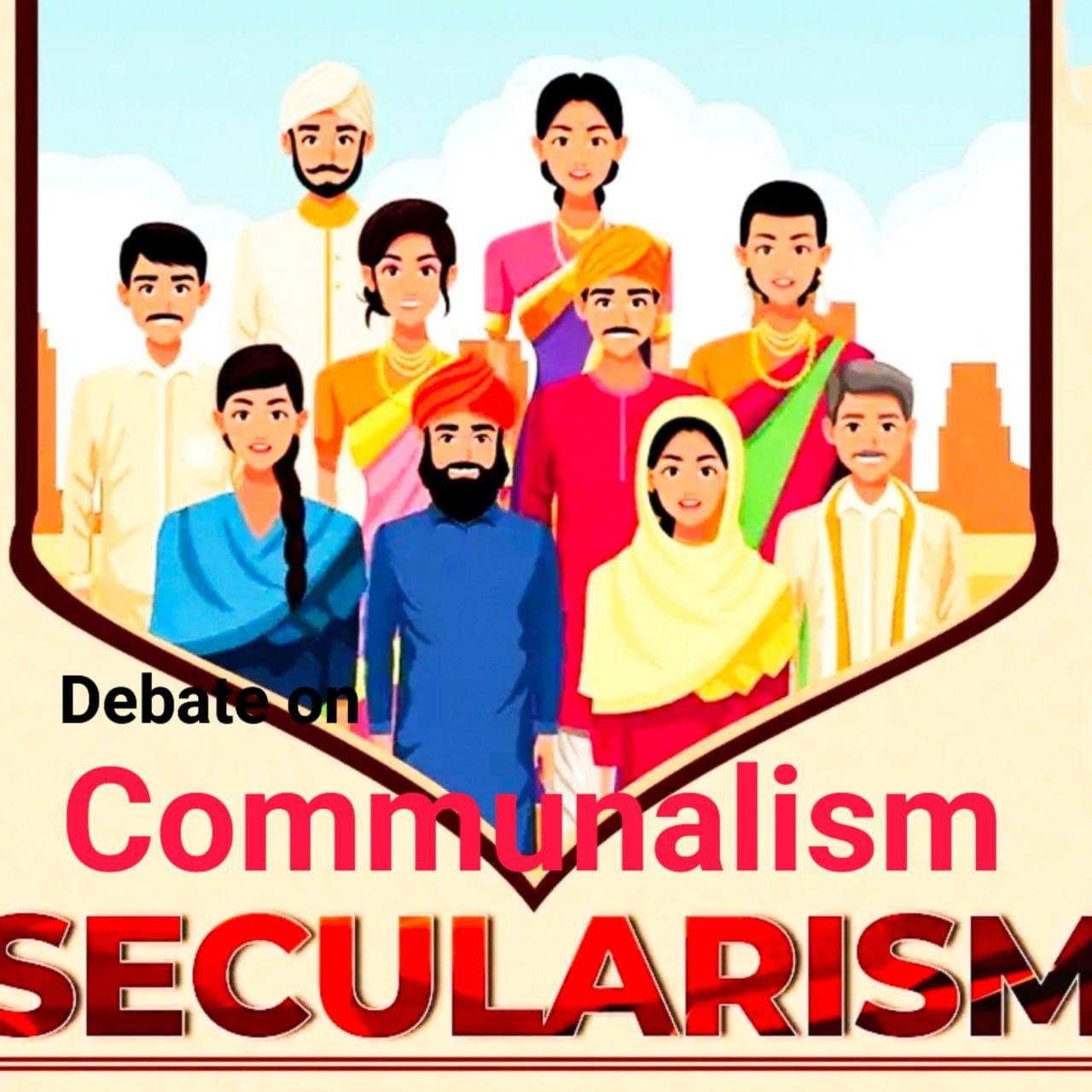Secularism and Communalism: Debates
The relationship between secularism and communalism has been a significant subject of debate, particularly in pluralistic and diverse societies like India. Secularism advocates for the equal treatment of all religions by the state and the separation of religion from politics, while communalism involves political exploitation of religious identities to create division or conflict. These concepts are often seen as opposites, with secularism promoting unity and communalism fueling division based on religious identities.
1. Understanding Secularism vs. Communalism

- Secularism:
- Secularism emphasizes that the state should treat all citizens equally, regardless of their religion.
- It advocates for the separation of religion from politics and governance.
- Secularism promotes the idea of individual freedom in matters of faith, allowing people to follow any religion or none at all.
- In India, secularism is about “equal respect” for all religions, while in Western contexts, it typically refers to a strict separation of religion from the state.

- Communalism:
- Communalism refers to the excessive attachment to one’s religious identity, leading to a worldview where the interests of one’s religious community are prioritized over those of other groups or the nation as a whole.
- It often manifests as hostility toward other religious communities, and it can lead to violence, social disharmony, and political polarization.
- Communalism thrives on religious exclusivism, where religious identities become political tools to mobilize communities against each other, particularly during elections.

2. Key Debates on Secularism and Communalism
a. Secularism vs. Pseudo-secularism
- Debate: One of the major debates in India revolves around the charge of pseudo-secularism. Critics argue that certain political parties or groups use secularism to favor particular religious communities, especially minorities, for electoral gains. This is seen as compromising true secularism, where all religions should be treated equally by the state.
- Proponents of this view argue that in the guise of protecting minority rights, some political actors indulge in vote-bank politics, neglecting the majority community’s interests.
- Supporters of secularism argue that secularism is necessary to protect the rights of minorities and maintain social harmony in a diverse country. They contend that accusations of pseudo-secularism are often attempts to undermine the secular fabric of the country.
b. Secularism and Religious Tolerance
- Debate: Another debate is whether secularism promotes genuine religious tolerance, or whether it imposes a form of neutrality that dilutes religious values and traditions.
- Critics argue that secularism may lead to the erosion of religious identity or marginalize religion from public life, reducing the importance of faith-based values in society.
- On the other hand, proponents of secularism argue that it protects religious freedom by ensuring that no religion dominates the state or imposes its beliefs on others. This helps maintain peace and prevents religious conflict.
c. Indian Secularism vs. Western Secularism
- Debate: A crucial debate centers around the differences between Indian secularism and Western secularism.
- In Western countries, secularism often means strict separation of religion and state. The state does not intervene in religious matters, and religion is considered a private affair.
- In India, secularism means equal respect for all religions (Sarva Dharma Sambhava). The state actively engages with religious communities to ensure equality and protect minority rights. Critics argue that this sometimes leads to perceived state favoritism towards certain religious groups, whereas others feel that this model suits India’s diverse religious landscape.
d. Secularism as an Elite Concept
- Debate: Another criticism is that secularism is an elite, Western concept imposed on non-Western societies like India. Some argue that secularism, as an imported idea, does not align with India’s spiritual and religious traditions.
- Critics claim that secularism was adopted by the political elite during the colonial and post-colonial era and is not rooted in India’s historical experience, where religion played a major role in public life.
- Supporters counter that secularism is essential for modern governance in multi-religious societies and serves as a bulwark against communalism and religious violence.
e. Communalism and Electoral Politics
- Debate: Communalism is often used as a tool in electoral politics. Political parties have been accused of exploiting religious identities to consolidate votes during elections.
- Proponents of this critique argue that the politicization of religion deepens divisions within society and undermines national unity. They highlight how communal politics can lead to violence, polarization, and social unrest, as seen in communal riots or religious tensions.
- On the other hand, defenders of identity politics might argue that religious communities have distinct concerns that deserve political attention. However, this line of reasoning often blurs into communalism when religious differences are exaggerated for political gain.
3. Secularism and Communalism in the Indian Context
In India, where multiple religions coexist, secularism is seen as essential for maintaining unity in diversity. However, the rise of communalism has often threatened the secular fabric of the nation. Communal tensions and violence have periodically erupted, particularly when religious identities are manipulated for political purposes.
- Majoritarian Communalism: This form of communalism arises when the dominant religious group seeks to impose its will over minority groups. In India, this is often seen in the Hindutva ideology, where certain groups advocate for the dominance of Hindu culture and religion in public life, leading to marginalization or exclusion of other religions.
- Minority Communalism: This can also occur within religious minorities, where the focus is on protecting or asserting the rights of a particular religious community. For example, some minority religious leaders may adopt a communal stance, asserting the distinct identity of their religious group in opposition to the majority.
4. Possible Remedies to Combat Communalism
To mitigate the harmful effects of communalism and promote secularism, the following steps can be taken:
- Promote Inclusive Secular Education:
- Education should emphasize common values, mutual respect, and understanding across religious communities. History should be taught in a way that promotes unity rather than division.
- Strict Legal Action Against Communal Violence:
- Governments must take firm and prompt action to prevent and punish those responsible for communal violence. Enforcing laws like the Unlawful Activities Prevention Act (UAPA) and strengthening communal harmony measures are essential.
- Civic Education and Dialogue:
- Programs that promote interfaith dialogue and civic education can help build bridges between communities. Civil society initiatives that encourage interaction across religious lines should be supported.
- Regulation of Political Rhetoric:
- Political leaders should be held accountable for inciting communal tensions. Laws against hate speech and communal propaganda during elections must be rigorously enforced.
- Empowering Secular Institutions:
- Strengthening secular institutions like the judiciary, Election Commission, and human rights commissions is key to ensuring that communalism does not undermine the democratic process.
Conclusion
The debate between secularism and communalism reflects the broader tension between unity and division in diverse societies. Secularism is essential for maintaining equality and preventing religious conflict, while communalism can lead to division, violence, and social disharmony. By promoting inclusive policies, secular education, and legal protections, societies can resist the harmful effects of communalism while fostering the principles of secularism.

